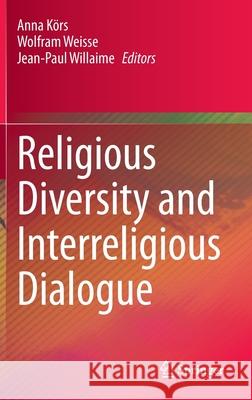Religious Diversity and Interreligious Dialogue » książka



Religious Diversity and Interreligious Dialogue
ISBN-13: 9783030318550 / Angielski / Twarda / 2020 / 339 str.
Religious Diversity and Interreligious Dialogue
ISBN-13: 9783030318550 / Angielski / Twarda / 2020 / 339 str.
(netto: 536,72 VAT: 5%)
Najniższa cena z 30 dni: 539,74
ok. 16-18 dni roboczych.
Darmowa dostawa!
Chapter1. Preface (Wilhelm Krull).- Chapter2. Introduction (Anna Körs, Wolfram Weisse and Jean-Paul Willaime).- Chapter3. The Role of Religion for Living Together in a Diverse Society (Aydan Özoguz).- Chapter4. Toward a New Paradigm for Religion in a Pluralist Age (Peter L. Berger).- Chapter5. Global Migration, Religious Diversity and Dialogue: Towards a Post-Westphalian Circumstance (Peter Beyer).- Chapter6. The Established and the Newcomers. A Weberian-Bourdieusian View of Congregations in the Swiss Religious Field (Jörg Stolz and Christophe Monnot).- Chapter7. Integration, Laïcité and Religion in France (Jean-Paul Willaime).- Chapter8. Governance of Religious Diversity – Socio-Legal Dynamics in Europe (Matthias Koenig).- Chapter9. Formulas of Peace? Interreligious actors and the local governance of religious diversity in Europe (Maria del Mal Griera).- Chapter10. “Laïcité in the Make”: Negotiating Secularism and Religious Diversity in the French Local Context (Julia Martínez Ariño).- Chapter11. Crossing the lines? Interfaith Governance as an arena of boundary work (Alexander Kenneth-Nagel).- Chapter12. Governance of Religious Diversity in Local Context – the Case Study of Hamburg (Anna Körs).- Chapter13. A territorial perspective on religious pluralization in Europe (Nicola Tietze).- Chapter14. Attacks in Paris: when the France of believers rediscovers a common soul (Jonathan Richard).- Chapter15. Narrating Stability within Interreligious Dialogue. First Results of a Qualitative Inquiry on Consequences of Plurality Experiences for Religious Identity (Gritt Klinkhammer and Anna Neumaier).- Chapter16. Perception and Political Meaning of Religious Plurality and the Role of Media (Gert Pickel).- Chapter17. Contribution of Religious Education to a Better Living Together in Europe (Robert Jackson).- Chapter18. Religious Education in Contextual Perspective (Thorsten Knauth and Dörthe Vieregge).- Chapter19. Concepts and Praxis of Inter-Religious and Socio-Religious Dialogue (Reinhold Bernhardt).- Chapter20. Dialogue in the Public Sphere: “Not an ambulance service, but a public health programme” (Anantanand Rambachan).- Chapter21. The Relevance of Interreligious Dialogue in the Public Sphere. Some Misgivings (Perry Schmidt-Leukel).- Chapter22. Interreligious Dialogue in the Public Spere. An Alevi Perpective (Handan Aksünger).- Chapter23. Interreligious Dialogue. Challenges and Prospects within a Secular State and Postsecular Society (Johannes Frühbauer).- Chapter24. Dialogical Theology – Doing Theology Together. A Buddhist Response to the Challenge of Religious Pluralisation (Carola Roloff).- Chapter25. Self and Other in Contemporary Buddhist Inter-Communal Relations: Engaged Buddhism, Buddhist Nationalist and Buddhist Theological Perspectives (Sallie B. King).- Chapter26. Interreligious Encounter and Human Rights. A Jewish Vantage Point (Ephraim Meir).- Chapter27. Dialogical Theology and Social Engagement (Paul Knitter).
Anna Körs is scientific manager and vice director of the Academy of World Religions at Hamburg University. She was co-leader of the international research project “Religion and Dialogue in Modern Societies“ (2013-2018) funded by the Federal Ministry of Education and Research, Germany. Her main research interests are the governance of religious diversity, religion and politics, religion and education, interreligious relations and dialogue, congregational studies, sacred spaces. She has recently published on “The Plurality of Peter Berger’s ‘Two Pluralisms‘ in Germany“ in “Society“ (Vol. 54, 2017) and is co-editor of the book “Religion and Dialogue in the City. Case Studies on Interreligious Encounter in Urban Community and Education“ (ed. with Julia Ipgrave, Thorsten Knauth, Dörthe Vieregge, Marie von der Lippe; Waxmann, 2018).
This edited volume offers solutions on the challenges of religious pluralisation from a European perspective. It gives special attention to interreligious dialogue and interfaith relations as specific means of dealing with plurality. In particular, the contributors describe innovative scientific approaches and broad political and social scopes of action for addressing the diversity of beliefs, practices, and traditions.
In total, more than 25 essays bring together interdisciplinary and international research perspectives. The papers cover a wide thematic range. They highlight how religious pluralisation effects such fields as theology, politics, civil society, education, and communication/media. The contributors not only illustrate academic debates about religious diversity but they also look at the political and social scope for dealing with such. Coverage spans numerous countries, and beliefs, from Buddhism to Judaism.
This book features presentations from the Herrenhausen Conference on "Religious Pluralisation - A Challenge for Modern Societies," held in Hanover, Germany, October 2016. This insightful collection will benefit students and researchers with an interest in religion and laicism, interreligious dialogue, governance of religious diversity, and religion in the public sphere.
1997-2026 DolnySlask.com Agencja Internetowa
KrainaKsiazek.PL - Księgarnia Internetowa









